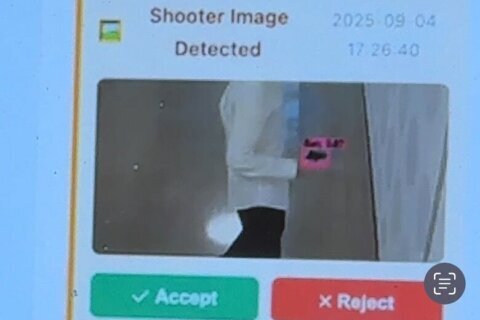A Montgomery County, Maryland, judge has ruled prosecutors will have access to most of the medical records of Catherine Hoggle, as the judge decides whether she is competent to stand trial for murder in the deaths of her two children.
Judge Richard Jordan rejected the arguments from defense attorney David Felsen that Hoggle’s records since 2014 are both privileged and irrelevant as to whether she is competent in 2022 to assist in her own defense in a murder trial. Prosecutors had issued a subpoena for the records to Clifton T. Perkins Hospital, where Hoggle has been treated since 2015.
Felsen argued releasing years of doctors’ notes, detailing conversations and treatment with his client to prosecutors, was “outrageous,” since he and his client had not waived patient-doctor privilege.
“The matter before the court is her current competency. It’s not how she was in 2014, ’15, or ’16. Of what relevance was Ms. Hoggle’s menstrual cycle in 2017? What does that have to do with her competency in 2022? The answer? None,” said Felsen.
Police said Hoggle was the last person to see 3-year-old Sarah and 2-year-old Jacob before they disappeared in September 2014. Hoggle was initially charged with three misdemeanors related to her missing children, then indicted in September 2017 on murder charges.
With a long history of mental health issues before her arrest, Hoggle was first found incompetent to stand trial in January 2015. Every evaluation since then has found her dangerous and unable to assist in her own defense, but until 2020, doctors held open the possibility that she could be restored to competency.
Montgomery County State’s Attorney John McCarthy said he was seeking the reports to test the conclusions of the doctors, who repeatedly found Hoggle restorable, before concluding in the Feb. 14, 2020, report that she was no longer restorable.
“We are looking at the competency of the doctors,” said McCarthy. “How do you go from 17 restorables, to all of a sudden she’s not restorable, and nothing has changed?”
The Feb. 14, 2020, conclusion that Hoggle was no longer restorable came as the judge was considering whether a 5-year-deadline for prosecutors to put Hoggle on trial had run out.
“Did they write that because they had to write that? Did they think the clock had run out?” McCarthy wondered.
Although judges typically rely heavily on doctors’ conclusions, the judge, rather than the doctor, makes the determination whether a defendant is competent to stand trial.
Defense attorney Felsen said that although a doctor’s competency evaluation isn’t privileged, everything else in a patient’s medical file is. Felsen said materials in the file aren’t relevant at this point, since the defense has not said whether it would claim Hoggle was not criminally responsible at the time of the offense, Maryland’s version of an insanity defense.
“This isn’t NCR — this is only if she’s competent to participate in her own defense,” said Felsen. “Even if someone admitted to a crime in a therapeutic situation, that could not be used.”
Felsen repeated his claim that prosecutors could improperly harvest information from the files: “They don’t even know what they’re looking for.”
However, judge Jordan said he wanted to learn more about how doctors reached their conclusions: “That seems reasonable to the court. What led to the report? What findings were made? What observations were made?”
The judge acknowledged the defense’s argument: “There’s privilege, but it’s a matter of balance,” said Jordan. “It doesn’t open the door completely.”
Jordan ordered a representative with Clifton T. Perkins Hospital, which participated in the hearing, to send Hoggle’s reports directly to chambers under seal.
The judge said he would look at the materials in chamber: “The court will determine what’s not relevant, and filter out things that are clearly not relevant.”
Hoggle’s attorney asked for clarification on whether prosecutors would be able to use what it discovers in the files in future litigation.
“I’m not sure at this point what the answer is,” Jordan responded.
The judge had been scheduled to rule on Oct. 7 whether Hoggle was competent to stand trial. However, he said he would reschedule that hearing — likely until November — since the process of providing and reviewing Hoggle’s medical records will take several weeks.
“I know a lot of people on both sides are waiting for an answer,” Jordan said. “But, it’s very, very important that we get it right.”








